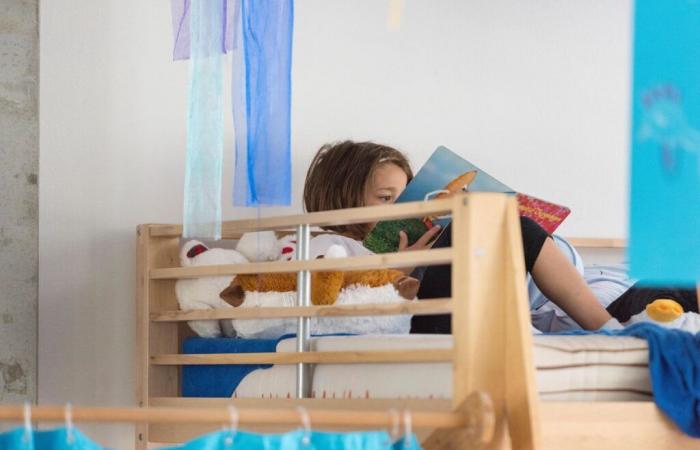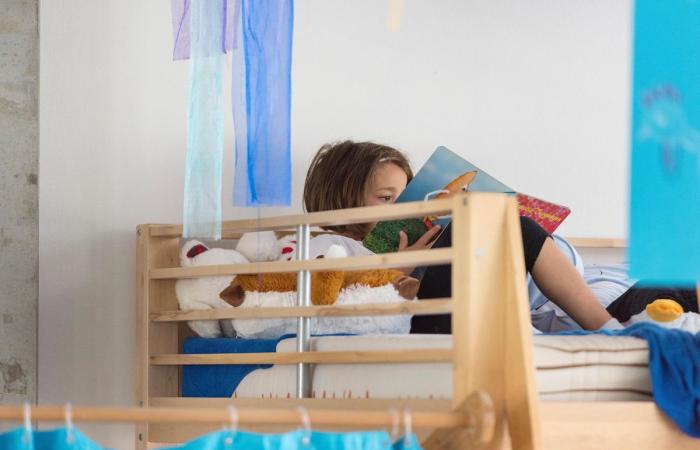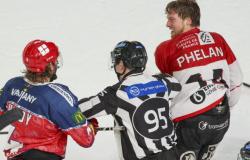Family –
“Talk with me”, the program for toddlers is celebrating its 10th anniversary.
Improving language skills in preschool children is PAM’s ambition. Born ten years ago in Vernier, he was emulated in the canton and in French-speaking Switzerland.
Published today at 10:00 a.m.
Photo d’illustation.
© KEYSTONE / CHRISTIAN BEUTLER
Subscribe now and enjoy the audio playback feature.
BotTalk
- “Talk with Me” began as a pilot project in 2014.
- The program aims to improve the language skills of young children.
- Video analysis is used to evaluate and adjust educational practices.
- Today, ten Verniolane structures and other cities have adopted the program.
«Talk with me» is a method of learning language for 2-4 year olds, born ten years ago in Vernier, under the leadership of Thierry Apothéloz, former municipal administrative councilor and current State Councilor, and Ruth Oberson, the head of the department. of childhood.
In 2013, a Verniolan delegation went to Grenoble to learn about a method called PARLER Bambin. Its goal is to improve the language skills of children aged 18 to 36 months, in order to reduce social inequalities.
On their return, the group contacted Professor Pascal Zesiger, professor of psycholinguistics at the Faculty of Psychology and Educational Sciences at the University of Geneva, and Monique Othenin-Girard, collaborator at the cantonal integration office. (BIC formerly BIE)
Pilot project
Joined by educators, the project initiators set to work to create a theoretical framework, tools and staff training. A competition is launched to find the name of the program. The choice is Speak with me, PAM. In 2014, it was introduced as a pilot project in two Verniolane early childhood care structures (SAPE), the Vernier-Village kindergarten and the Avanchets crèche.
In 2015, Tamara Patrucco-Nanchen, speech psychologist, was hired to set up the practical training. His salary is financed by the Office of Integration and Citizenship. “I was asked to modify the practices of educators in terms of communication and language addressed to children,” she describes. My job was to observe and point out what was wrong.”
Very quickly, she realizes that it takes time to communicate after an observation. “At least an hour of discussion was necessary.” She finds the exchanges rich but they do not allow adjustments to be made.
Using video
“People don’t necessarily realize their postures and we don’t always speak the same language.” The speech therapist decides to use the film to work on more objective bases, by video feedback. “I filmed for an hour and a half then spoke with the staff. Elements were being put in place but the exchanges were very direct and confronting.”
Tamara Petrucco-Nanchen therefore decides to calmly analyze the video at home and then discusses postures and language attitudes with the educational teams. All staff are filmed.
“The idea is to talk about situations and not people, the analysis of practice is done at the meta level,” she explains. All the educators appear in similar situations, which allows us to use the same language in terms of posture and attitude.” Little by little, the training is put in place and co-constructed with the teams.
In 2017, Professor Laurent Filliettaz, professor of educational sciences in the field of adult education, set up training for reference educators in Vernier. The idea is to practice “Talk with me” within each of the SAPEs. Around fifteen advisors will be trained by Marianne Zogmal, Doctor in educational sciences at UNIGE and scientific collaborator.
Today, all ten verniolane structures use PAM. Parents are also included in the program, through themes around the book, for example. Other towns like Meyrin and Carouge have adopted it. Valais, Vaud and Ticino also approached Tamara Petrucco-Nanchen.
Primary school
The Geneva Department of Public Education is also interested in lower levels… rightly so if we believe the latest research: “There is a direct link between the mastery of oral language and the learning of written language, underlines Pascal Zesiger, professor of psycholinguistics, at UNIGE. Studies show that a child’s skills in understanding and producing words as well as combining them to form sentences in early childhood are reliable predictors of later levels of reading and writing mastery. »
According to the psycholinguist, the phase which extends from birth to 4-5 years is particularly important for the establishment of spoken language, and if we support the child in its acquisition, this is equivalent to providing him with the best tools to approach school learning.
“Latest news”
Want to stay on top of the news? “Tribune de Genève” offers you two meetings per day, directly in your email box. So you don’t miss anything that’s happening in your canton, in Switzerland or around the world.
Other newsletters
Log in
Judith Monfrini is a journalist for the local section. With a legal background, she obtained her diploma from the Journalism and Media Training Center (CFJM) in 2015. She worked for more than ten years for the Médiaone group. (Radio Lac, One fm)More info
Did you find an error? Please report it to us.
0 comments







